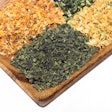
(YAKOBCHUK VIACHESLAV | shutterstock.com)
How often do U.S. veterinarians discuss pet food and pet nutrition with their pet-owning clients, and what kinds of issues and questions do these discussions cover? Recent data provide a glimpse of these important interactions, one of the most common ways that pet owners get information and insights on what to feed their pets.
In a pet nutrition-focused newsletter, the American Veterinary Medical Association shared responses from a survey of its veterinarian members:
- When asked if pet owners inquire more about pet food than they used to, 48 percent of the surveyed veterinarians responded “very much,” with 29 percent responding “a little” and 11 percent saying “somewhat.” (An equal percentage said no.)
- Perhaps more telling, especially given events in 2018, 91 percent of responding vets identified grain free as the pet food trend they hear most about from their clients, with a sharp drop-off to other trends: raw, 4.76 percent; unusual protein sources, 2.38 percent; and homemade pet food, 1.59 percent.
- On the other hand, though related to grain-free pet food (the Food and Drug Administration 2018 alert over the possible link to atypical cases of canine dilated cardiomyopathy, or DCM), 76 percent of the vets said they have not noticed an increase in incidence of DCM at their practices. Only 2.33 percent responded “very much” in terms of noticing an uptick, with 8 percent saying “somewhat” and 13 percent saying “a little.”
- In response to the question, “How often do you start conversations with clients about pet nutrition?” 82 percent said, “all the time,” while 13 percent responded “if needed to deal with a diagnosis”; 3.4 percent, “only when clients ask about it”; and 1.37 percent, “rarely.” It seems a strong majority of U.S. vets see nutrition as a key topic and area of responsibility for them in advising their clients.


















